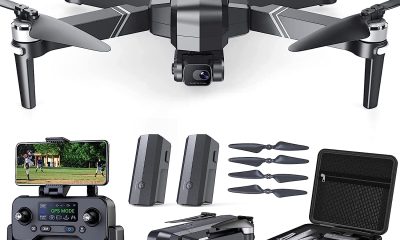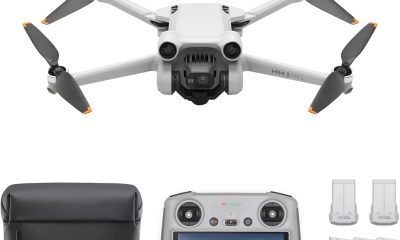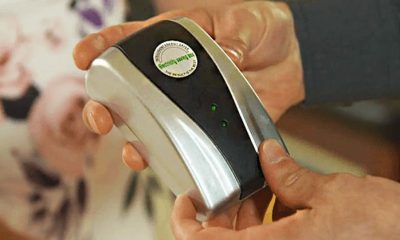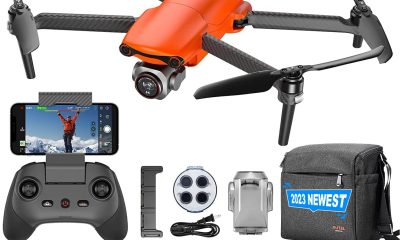Health
The Fitness World’s Transformation with Smart Home Gym Equipment

The fitness landscape is experiencing a profound transformation, evidenced by the rise of home gym equipment that reflects the current trends in technology and wellness. More people are opting for convenience and personalized fitness plans, making smart gym gear a staple in home workouts. This article explores the variety of home gym equipment available today and how it incorporates cutting-edge technology to enhance the user experience and the effectiveness of workouts.
The Emergence of Intelligent Fitness Gear
Gone are the days of traditional home gyms solely equipped with machines and free weights. Today’s smart home gym equipment includes interconnected devices that leverage AI to tailor workouts based on individual fitness levels, providing real-time feedback and guidance. The push towards these technologies has been accelerated by circumstances such as the COVID-19 pandemic, which has made working out from home more appealing than ever.
Types of Smart Home Gym Equipment
Interactive Cardio Machines: Cardio machines like treadmills, exercise bikes, and rowing machines now come with displays and live streaming capabilities. Brands like Peloton and NordicTrack are at the forefront, linking users to instructors and a global community for interactive and immersive workout experiences.
Cutting-edge Strength Training Systems: Systems such as Tonal, Tempo, and the Mirror employ smart technology to assess user posture and technique, adjust resistance levels automatically, and provide personalized workout recommendations. These systems not only save space with their sleek designs but also replace traditional weights through digital weight systems or adaptable resistance mechanisms.
Immersive Fitness in Reality: The integration of virtual reality (VR) technology into fitness routines offers a fully immersive experience, making exercising a game-like and enjoyable activity. Products like Oculus Quest, paired with apps like Supernatural, provide workout sessions in various settings, from scenic landscapes to specialized training environments.
Fitness Tracking Wearables: Devices like the Apple Watch or Fitbit enhance home workouts by monitoring heart rate, calories, and other fitness indicators. When connected to home gym equipment, these wearables can help tailor workout intensity and duration based on real-time data.
Intelligent Workout Accessories: Items such as smart yoga mats that show hand and foot placements and smart dumbbells that track repetitions and sets are enhancing the training experience, helping users improve their form and track progress.
Advantages of Smart Home Exercise Gear
Personalization: AI-powered recommendations tailor workouts to individual fitness levels and goals, minimizing injury risk and optimizing results.
Convenience: The ability to participate in classes from home or receive guidance through a device negates the need for gym memberships and commuting.
Motivation: Real-time feedback and connections to a fitness community can enhance motivation by fostering an environment of competition and support.
Space Efficiency: Many smart exercise systems are designed to be space-efficient, benefiting those with limited room.
Challenges and Considerations
While the benefits are clear, there are also challenges to consider when investing in home exercise gear:
Cost: Smart fitness equipment typically comes with a higher price tag and may require ongoing subscriptions for full feature access.
Reliance on Technology: Dependence on connectivity and the potential for technical issues are drawbacks for some users.
Privacy Concerns: With increased data collection, users should consider privacy and data security when selecting equipment.
The Future of Home Fitness
As technology continues to evolve, the future of home fitness looks promising. Anticipated advancements include AI-powered trainers that provide real-time feedback and health monitoring features capable of predicting and preventing injuries.
The integration of technology with home gym equipment is reshaping our workout routines, enhancing accessibility, customization, and engagement. As we look forward, the fusion of technology and fitness is expected to continue, offering innovative and efficient ways to maintain fitness from the comfort of one’s own home. Whether you are a fitness enthusiast or just beginning your wellness journey, smart home gyms represent a blend of technology and convenience designed to support your fitness goals.
Health
Fitness Gaming: Enjoyable Exertion and Exercise with Technology

In this rapid evolution of fitness, technology has become absolutely indispensable. Probably the coolest technology to arise from this is fitness gaming. The concept of fitness gaming, otherwise called “exergaming,” is to deal with fun and interactive methods of staying fit and active by taking engaging video game-playing experiences and making the activity in itself some form of physical movement.
Whether a gamer at heart or someone merely looking for ways to make exercise a more fun activity, fitness gaming is a new way to achieve health and well-being.
What is Fitness Gaming?
Fitness gaming is a form of gaming using video games that require activity to play them and include, but are not limited to, motion sensors, virtual reality, and wearables. Running parallel to the successes of “Wii Fit” and “Just Dance” has been the stellar growth of virtual reality platforms like Oculus Quest, PlayStation VR, and specialized workout apps designed to integrate with either video game platforms or mobile phones.
Apart from the normal exercises, which may be mundane and hence uninteresting, it is fun because the fitness games help gamers achieve their fitness goals.
How Fitness Gaming Works
Fitness gaming could involve several sorts of motion-tracking technologies that may be combined to provide real-time feedback. It involves motion sensing via something like XBOX Kinect or Joy-Con controllers of the Nintendo Switch that lets users both move in reaction to what is happening on screen. Virtual Reality-based games throw the user into a virtual world; one dodges obstacles, punches, or choreographs some dance while immersed in some entertaining storyline.
Most of these games are oriented toward improvement in various parts of physical health, including cardio, strength, flexibility, and coordination. A very good example involves rhythm-based games, such as “Beat Saber,” where users have to make fast hand movements through target slashes, thus fully working the arms, core, and legs. Similarly, boxing games like “Thrill of the Fight” give extremely excessive cardio sessions while teaching reflexes and hand-to-eye coordination.
Fitness Gaming: Shaping the Future
- Motivation through Gaming: Fitness gaming is hugely motivational—in fact, one of the key benefits—to a player. In cases where exercises are transformed into some sort of game, it helps keep him or her both involved and challenged. Competition, scoring, progress tracking allow the player to stay motivated toward their goals without the tensions of going to the gym.
- Accessible to All Fitness Levels: Fitness games really can work for anyone, from the total beginner up to the well-seasoned athlete. Most of these games have different difficulty levels; therefore, the player can easily adjust the difficulty, intensity, and length or duration of a workout according to one’s level of fitness.
- Full-body workout: Most of the fit games incorporate a range of motion that includes large muscle groups. Games involving jumping, squatting, stretching, and running raise a workout for the whole body to effect cardiovascular benefits, building muscle strength, and coordination. In this way, one gets to have a very good sweat without having a feeling that he/she is really doing a “workout”.
- Social Advantage: Another major plus could be a social advantage. Most of these fitness games boast multi-player functions, whereby friends or family members can work out with one another—even in the case of long-distance separations. These virtual leaderboards, online challenges, and co-op mode create a community atmosphere wherein people support and challenge each other in fun ways.
Fitness Gaming: The Future of Workouts
Technology will continue improving, and it is just about time for fitness gaming to go mainstream. Innovations in wearables, motion sensors, and even head-worn virtual reality gadgets will ensure fitness games become more immersive and physically challenging. From interactive workout apps that can measure heart rates to games that can emulate natural sports, the experiences will appeal to different kinds of people.
Fitness gaming lets many people who can’t find the time or motivation otherwise make physical exercise a form of fun and competition. Because it marries two largely separate worlds—the excitement of gaming and the health benefit of exercise—it opens the door to a very accessible, enjoyable, and sustainable form of fitness. Exergaming literally is a game-changer in the world of fitness.
Health
Telemedicine Gadgets Depict the Future of Remote Health Care

What used to be an ancillary service suddenly became mainstream in healthcare, especially after the COVID-19 outbreak. Patients and care providers found safer and more convenient means of substituting for personal visits. Telemedicine literally became the best option. Not only are more people warming up to the idea of remote health, but innovative telemedicine-related gadgets are redefining what medical care from home will look and feel like in the near future.
The Emergence of Telemedicine Devices
With increased demand for remote healthcare, specially adapted telemedicine devices will change the way patients communicate with practitioners. The ability of such tools to bridge the gap between virtual and in-person consultations rests in their promotion of better data collection and accuracy in diagnoses.
Wearable health monitors are no longer just about counting steps and detecting heart rates but have also taken the form of smartwatches and fitness trackers. Many come armed with sensors to measure blood oxygen saturation, irregular heartbeat, or even sleep patterns. This enables physicians to make real-time inferences about their patients’ health states and makes it easy to manage chronic diseases such as diabetes, hypertension, and heart disease remotely.
Best Telemedicine Devices
- Remote Monitoring Devices: Blood pressure monitors, glucometers, and pulse oximeters have become staples in remote healthcare. Patients can use these devices to check their vital statistics from home, with the data being sent instantly to their healthcare provider. A real-time dashboard can alert a doctor if the reading of a patient is outside the normal range, ensuring prompt treatment.
- Smart Stethoscopes: These are set to be a game-changer for remote consultations. Smart stethoscopes can digitize heart and lung sounds, allowing physicians to check heartbeats, breathing patterns, and other critical sounds through virtual consultations. Devices like Eko Core demonstrate how precise diagnostic tools can be integrated into telehealth for accurate at-home assessments.
- Telemedicine Kiosks: Though not home devices, telemedicine kiosks are emerging in pharmacies and clinics. Equipped with everything from thermometers to blood pressure cuffs and other critical medical devices, patients can now conduct tests on their own while being remotely guided by a healthcare provider. This reduces wait times and eliminates unnecessary hospital visits.
- Portable Ultrasound Devices: Portable ultrasound devices, such as Butterfly iQ, have allowed healthcare providers to study ultrasounds remotely. These devices help diagnose and monitor conditions related to pregnancy, organs, and more. Portable ultrasound machines are especially valuable in underserved or geographically remote communities, bridging gaps in healthcare.
Artificial intelligence (AI) applications are also extending to advanced gadget use, monitoring symptoms, showcasing personalized health tips, and even suggesting professional care when necessary. These applications analyze data from wearables or home monitoring devices and provide insights or recommendations based on the user’s health patterns.
The Benefits and Challenges
Telemedicine devices make healthcare more accessible, especially for people in rural areas or with mobility issues. They provide a safe and convenient way to monitor health without sacrificing quality care. These devices also help healthcare providers support more patients efficiently and reduce pressure on medical resources.
However, there are challenges to overcome: the devices need to be user-friendly, affordable, and accessible to all populations. Connectivity, data security, and accuracy assurance are additional hurdles that must be addressed as the technology gains momentum.
The Future of Telemedicine Devices
As technology improves, the capabilities of telemedicine gadgets will expand. Future advancements may include AI diagnostics, integrations into electronic health records, and virtual reality for remote physical therapy or surgical consultations. Telemedicine, once considered an adjunct to traditional care, has now become a crucial part of modern healthcare.
At the core of this transformation are telemedicine gadgets, helping both patients and providers navigate healthcare in a more timely, effective, and efficient manner. As these devices continue to evolve, they will guide healthcare into a future that is remote, smart, and accessible.
Health
Best Apps for Mental Well-being: From Meditation to Therapy

In today’s fast-paced world, many people are prioritizing mental health as a key aspect of maintaining balance and overall wellness. Thanks to advancements in technology, individuals now have access to mental health resources through a variety of apps designed to support them in managing stress, anxiety, depression, and overall mental well-being. These apps offer a range of features, from meditation techniques to virtual therapy sessions, catering to diverse needs and preferences, making mental health care more user-friendly and adaptable.
1. Calm: Meditation and Mindfulness Practices
Calm stands out as one of the most sought-after apps for meditation and mindfulness practices. It provides guided meditation sessions that address various life aspects, such as stress management, sleep improvement, focus enhancement, and personal development. The app is designed with user convenience in mind, offering exercises that can be completed in as little as three minutes, making it easy to integrate into any busy schedule. Additionally, Calm includes mindfulness activities for children, making it an excellent choice for families seeking ways to incorporate well-being practices into their everyday lives.
Top Features:
- Various meditation sessions available
- Relaxing sleep sounds and sleepcasts
- Exercise routines for movement and stretching
- SOS support sessions during high-stress moments
2. Headspace: Structured Mindfulness Practice
Headspace is popular among both beginners and experienced meditators due to its user-friendly design and diverse meditation offerings. The structured approach of the app helps users establish a consistent mindfulness practice, leading to enhanced clarity and emotional balance.
3. BetterHelp: Convenient Online Therapy
BetterHelp is an online therapy platform that connects individuals with licensed therapists through a convenient app. It allows for flexible therapy sessions where users can interact with their therapist via text chat, phone calls, or video calls. The services provided cover a spectrum of mental health concerns, such as anxiety, depression, relationships, and self-esteem.
Highlighted Features:
- Access to licensed therapists
- Multiple communication options
- Flexible scheduling
- Journal feature for tracking progress
One of the main advantages of BetterHelp is the opportunity to receive professional help from the comfort of one’s own home, making therapy more accessible to those who may struggle with attending face-to-face appointments. The app’s diverse communication tools enable users to seek support in a manner that aligns best with their needs.
4. Talkspace: Versatile Therapy Options
Talkspace is another online therapy app that connects users with therapists and offers multiple communication avenues such as text messages, video calls, and audio messages. Similar to BetterHelp, Talkspace focuses on addressing issues like depression, anxiety, substance abuse, and relationship challenges. This platform proves beneficial for individuals seeking therapy but facing constraints in terms of time or resources for in-person sessions.
Features:
- Connect with licensed therapists with specialized knowledge
- Unlimited messaging therapy available
- Therapy sessions offered through video, audio, or text
- Some users may have insurance coverage
Additionally, Talkspace provides psychiatry services for those needing mental health medications along with therapy. This makes it a comprehensive solution for both counseling and medication management.
5. Sanvello: Anxiety and Depression Relief
Sanvello aims to assist users in handling stress, anxiety, and depression by using cognitive behavioral therapy (CBT) techniques, mood tracking, and mindfulness practices. The app provides guided journeys focusing on mental health objectives like boosting confidence, reducing anxiety, or coping with stress. Users can also access community support to connect with others facing similar struggles.
Key Features:
- Guided journeys based on CBT principles
- Daily mood tracking and journaling options
- Meditation and relaxation techniques
- Peer support community for interaction
Sanvello’s evidence-based approach makes it a solid option for those looking for a scientifically proven way to enhance their mental well-being. The mood tracking feature helps users better understand their patterns and triggers.
6. Moodfit: Mental Health Fitness
Moodfit is a mental health app that equips users with tools to manage their emotions and overall well-being. The app features mood monitoring, mindfulness activities, cognitive behavioral therapy tools, and a gratitude journal. Additionally, Moodfit offers educational materials on mental health topics and personalized insights based on user information.
Notable Features:
- Personalizable mental health resources
- Tracking moods and thoughts
- Gratitude diary
- Breathing techniques
Moodfit’s range of tools makes it a versatile choice for those seeking to enhance their well-being through introspection and daily routines. The app’s capacity to customize its services according to individual requirements is a significant benefit for users aiming for a tailored mental health regimen.
Given the growing recognition of mental well-being’s significance, such applications provide essential support in dealing with stress, anxiety, depression, and overall wellness. Whether you wish to kickstart meditation practices, address sleep issues, or connect with a counselor, there’s an app designed specifically for your needs. By incorporating these resources into your routine, you can take proactive measures toward sustaining and enhancing your mental health.
Trending

 Drones1 year ago
Drones1 year agoRuko-F11GIM-Drones-Camera-Batteries

 Drones1 year ago
Drones1 year agoDJI’s tiny drone

 Home1 year ago
Home1 year agoElectroSave Review

 Drones1 year ago
Drones1 year agoAutel Robotics EVO Lite+ Review

 Bug Repellant Gadgets1 year ago
Bug Repellant Gadgets1 year agoSmosquito Review

 Photography & Videography Drones1 year ago
Photography & Videography Drones1 year agoStealth Hawk Pro Drone Review

 Beauty Gadgets1 year ago
Beauty Gadgets1 year agoBright Selfie Review

 Drones1 year ago
Drones1 year agoSwellpro-Fisherman-Fishing-Waterproof-Propellers Review





















